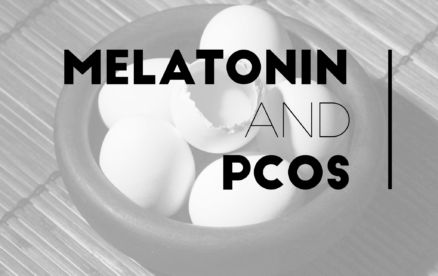I’m a molecule secreted from a little section of your brain called the pineal gland and from the retina in your eye1. I control different mechanisms related to your circadian rhythm and reproduction. I’ve been found in women’s ovaries1. I can help restore a normal menstrual cycle in women with PCOS. Who am I? If you guessed melatonin, you’re right! But let’s talk about that last part. Can melatonin really help restore a normal menstrual cycle with women in PCOS? Well, that’s what this new study is suggesting and it’s pretty cool if you ask me!
What is PCOS?
Polycystic ovarian syndrome (PCOS) is a women’s health condition that affects both the reproductive and metabolic systems of the body. It affects 6-10% of women in Canada2,3. The diagnosis of PCOS varies, even more so as we learn more about this syndrome from the literature.
Insulin resistance and inflammation underlay both the lean type, and weight loss resistance types of PCOS4. In order to receive a formal diagnosis of PCOS doctors also look for hyperandrogenism, oligo-ovulation (irregular ovulation) or anovulation (no ovulation), and polycystic ovaries on ultrasound2. Hyperandrogenism can be seen visually with acne and course hair growth on the body (hirsutism), but it may only be seen in the lab work in more subtle cases.
The Role Of Melatonin
Research into the role of melatonin in regards to ovarian function and PCOS is relatively limited. As a result, most studies have looked at melatonin in rats and ‘in vitro’, which means in a controlled environment separate from humans. In vitro, studies have shown that melatonin regulates steroid, follicle and egg formation in the ovary5. There has also been interesting research into the role of melatonin as an antioxidant, a molecule that protects against cellular damage6. From this aspect, melatonin seems to protect follicles so that they can mature correctly for ovulation6. It can also improve egg quality. From a reproductive perspective, the protective role of melatonin is proving to be increasingly important.
Results of A New Study
After six months of melatonin administration the participants saw significant improvements. Most importantly, there was a significant improvement in the frequency of menstrual cycles with an increase in the number of cycles occurring during six months7. There was also an increase in the amount of follicle-stimulating hormone7. A decrease in androgen levels, body weight and therefore BMI were observed, although the hip-to-waist ratio didn’t significantly change7.
Altogether, these findings show how promising an intervention with melatonin may be for those suffering from PCOS.
A Promising Future
More studies need to be done to confirm the efficacy and safety of long-term intervention with melatonin for PCOS. However, the results of this study have provided researchers in this field with another piece of the puzzle in determining what causes PCOS and what can help treat it. Hopefully this is a step in the right direction for those affected by this condition.
If you suffer from PCOS, talk to your healthcare professional to see if melatonin is right for you! It can be especially helpful if you suffer from sleep disturbances and struggle to fall asleep.
Do you have PCOS, have you tried melatonin? I would love to hear how it helped you!
References:
- Tamura, H., Takasaki, A., Taketani, T., Tanabe, M., Kizuka, F., Lee, L., … Sugino, N. (2013). Melatonin as a free radical scavenger in the ovarian follicle [Review]. Endocrine Journal, 60(1), 1–13. https://doi.org/10.1507/endocrj.EJ12-0263
- Dumesic, D. A. et al. Scientific Statement on the Diagnostic Criteria, Epidemiology, Pathophysiology, and Molecular Genetics of Polycystic Ovary Syndrome. Endocr. Rev. 36, 487–525 (2015).
- Canadian Women’s Health Network. (n.d.). Polycystic Ovary Syndrome (PCOS). Retrieved June 20, 2017, from http://www.cwhn.ca/en/node/44804
- Baptiste, C. G., Battista, M.-C., Trottier, A. & Baillargeon, J.-P. Insulin and hyperandrogenism in women with polycystic ovary syndrome. J. Steroid Biochem. Mol. Biol. 122, 42–52 (2010).
- Tanavde, V. S., & Maitra, A. (2003). In vitro modulation of steroidogenesis and gene expression by melatonin: a study with porcine antral follicles. Endocrine Research, 29(4), 399–410. Retrieved from http://www.ncbi.nlm.nih.gov/pubmed/14682469
- Jain, P., Jain, M., Haldar, C., Singh, T. B., & Jain, S. (2013). Melatonin and its correlation with testosterone in polycystic ovarian syndrome. Journal of Human Reproductive Sciences, 6(4), 253–8. https://doi.org/10.4103/0974-1208.126295
- Tagliaferri, V., Romualdi, D., Scarinci, E., Cicco, S. De, Florio, C. Di, Immediata, V., … Apa, R. (2017). Melatonin Treatment May Be Able to Restore Menstrual Cyclicity in Women With PCOS: A Pilot Study. Reproductive Sciences (Thousand Oaks, Calif.), 1933719117711262. https://doi.org/10.1177/1933719117711262

